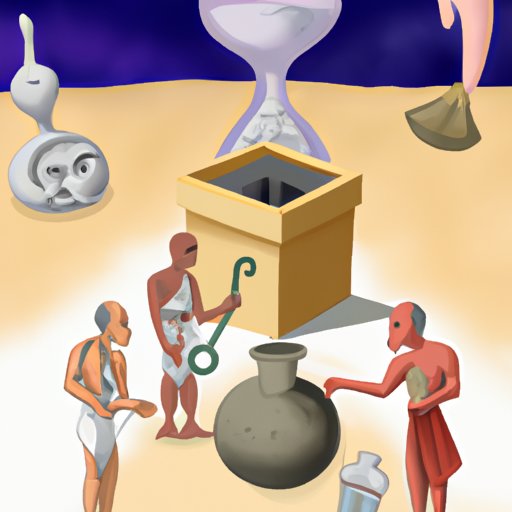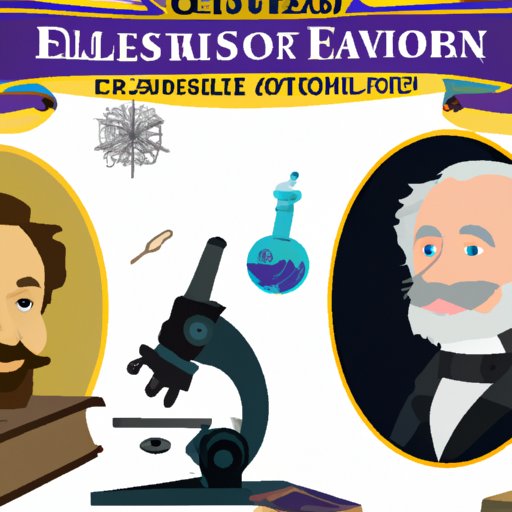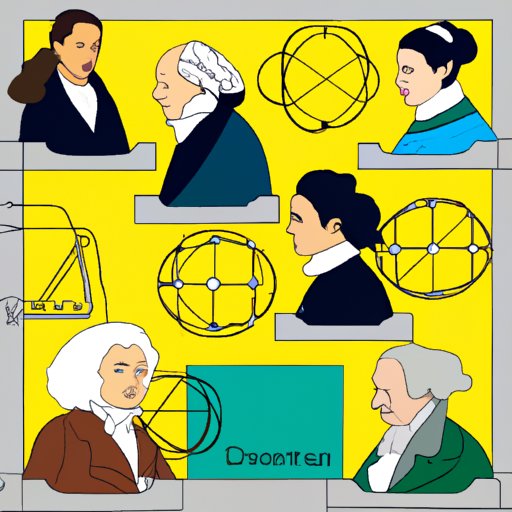Introduction
Science is defined as the study of the physical and natural world through observation and experimentation. It encompasses a vast array of disciplines, from astronomy and biology to mathematics and chemistry. Throughout its long history, science has played an important role in advancing our understanding of the universe and improving the lives of people around the world. In this article, we will explore the history of science and highlight some of the key discoveries and influential figures that have shaped the field.
A Timeline of Key Discoveries in the History of Science
The history of science stretches back thousands of years, with significant discoveries being made by ancient civilizations such as the Egyptians, Greeks, Romans, Chinese, Indians, and Arabs. Here are some of the most important breakthroughs in the history of science:
- 2500 BC – The Egyptians establish a system of medicine and develop the practice of mummification.
- 500 BC – Greek philosopher Pythagoras develops the concept of mathematical proof.
- 150 BC – Greek astronomer Hipparchus creates the first star catalog.
- 1025 AD – Persian scientist Ibn al-Haytham publishes his groundbreaking book on optics, Kitab al-Manazir.
- 1543 – Polish astronomer Nicolaus Copernicus publishes De Revolutionibus Orbium Coelestium, in which he argues that the Earth orbits the Sun.
- 1609 – Italian physicist Galileo Galilei uses a telescope to observe the night sky.
- 1687 – English mathematician Sir Isaac Newton publishes Philosophiae Naturalis Principia Mathematica, laying out his laws of motion and gravity.
- 1796 – English biologist Edward Jenner develops the first vaccine for smallpox.
- 1859 – English naturalist Charles Darwin publishes On the Origin of Species, outlining his theory of evolution.
- 1905 – German physicist Albert Einstein publishes his revolutionary paper on the special theory of relativity.
- 1953 – American scientists James Watson and Francis Crick publish their discovery of the double helix structure of DNA.
- 1969 – Apollo 11 astronauts Neil Armstrong, Edwin Aldrin, and Michael Collins become the first humans to land on the Moon.

How Ancient Civilizations Advanced Scientific Knowledge
Ancient civilizations laid the foundation for many of the scientific advancements that would come later. The Egyptians, for example, established a system of medicine and developed the practice of mummification. They also had a sophisticated understanding of mathematics and astronomy, using these skills to create calendars and measure the flooding of the Nile. The Greeks made major contributions to the fields of philosophy, mathematics, geometry, and astronomy. They were the first to formulate a scientific method and use deductive reasoning to reach conclusions about the natural world. The Romans advanced knowledge in fields such as engineering and architecture, while the Chinese are credited with inventing the compass and papermaking. Indian mathematicians developed the decimal system and the concept of zero, while Arab scientists made groundbreaking advances in the fields of optics, algebra, and medicine.

Exploring the Life and Work of Famous Scientists Throughout History
Throughout history, there have been many influential scientists who have made significant contributions to the advancement of scientific knowledge. Italian physicist Galileo Galilei (1564–1642) was one of the first scientists to use a telescope to observe the night sky and make new discoveries about the solar system. He was also an early proponent of the Copernican model, which argued that the Earth revolves around the Sun. English mathematician Sir Isaac Newton (1643–1727) is best known for his theories of motion and gravity. His groundbreaking work, Philosophiae Naturalis Principia Mathematica, laid the foundation for modern physics. English naturalist Charles Darwin (1809–1882) developed the theory of evolution through natural selection, which was outlined in his seminal work On the Origin of Species. German physicist Albert Einstein (1879–1955) developed the special theory of relativity, which revolutionized our understanding of space and time. And American scientists James Watson and Francis Crick (1920–present) famously discovered the double helix structure of DNA.
The Impact of the Scientific Revolution on Society
The scientific revolution is often said to have begun in the 16th century with the work of Nicolaus Copernicus, who argued that the Earth orbits the Sun rather than the other way around. This challenged the prevailing belief in geocentrism, which had been accepted by the Catholic Church for centuries. The scientific revolution had far-reaching implications for culture, economics, and politics. It gave rise to the Age of Enlightenment, a period of intellectual and cultural progress in Europe. It also ushered in the Industrial Revolution, which saw a shift from manual labor to mechanized production. This led to increased economic productivity and population growth. Finally, it paved the way for the development of democracy and human rights, as people began to question traditional authority and demand greater representation in government.

Examining the Contribution of Women to Science Throughout History
Women have made significant contributions to science throughout history, even though they have often gone unrecognized. Marie Curie (1867–1934), for example, was the first woman to win a Nobel Prize for her groundbreaking research in the field of radioactivity. Other notable female scientists include British astronomer Caroline Herschel (1750–1848), who discovered several comets; American chemist Marie Maynard Daly (1921–2003), who was the first African American woman to receive a Ph.D. in chemistry; and British computer scientist and codebreaker Alan Turing (1912–1954), who helped crack Nazi Germany’s Enigma code during World War II. In recent years, there has been a push to recognize the accomplishments of women in science and promote gender equality in the field.
Mapping Out the Development of Scientific Fields Over Time
As science has evolved over time, so too have the various fields that comprise it. Physics, for example, has advanced from early concepts such as Aristotle’s four elements to the modern understanding of quantum mechanics. Chemistry has progressed from the classical atomic model to a more nuanced understanding of chemical bonds and reactions. Biology has moved from a focus on anatomy and taxonomy to a deeper exploration of genetics and evolution. Astronomy has shifted from a reliance on myths and superstition to a data-driven approach based on observation and experimentation. And mathematics has gone from simple counting and geometry to complex equations and theories.
Conclusion
In conclusion, the history of science is a long and storied one, filled with key discoveries and influential figures who have shaped the field. From ancient civilizations to the scientific revolution and beyond, science has advanced our understanding of the universe and improved the lives of people around the world. As science continues to evolve, it is important to recognize and celebrate the contributions of all those who have helped advance the field.
(Note: Is this article not meeting your expectations? Do you have knowledge or insights to share? Unlock new opportunities and expand your reach by joining our authors team. Click Registration to join us and share your expertise with our readers.)
